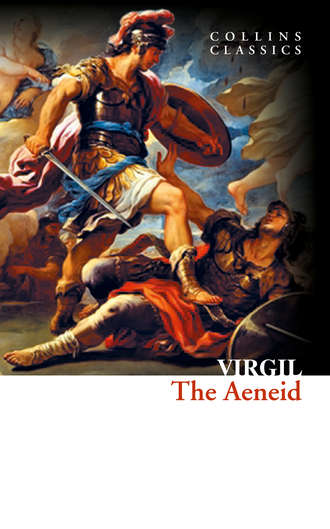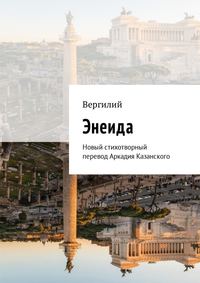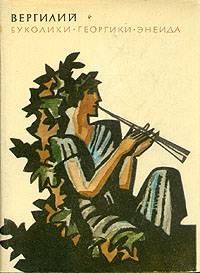
Полная версия
The Aeneid
Their labor to her future sway she speeds,
And passing with a gracious glance proceeds;
Then mounts the throne, high plac’d before the shrine:
In crowds around, the swarming people join.
She takes petitions, and dispenses laws,
Hears and determines ev’ry private cause;
Their tasks in equal portions she divides,
And, where unequal, there by lots decides.
Another way by chance Aeneas bends
His eyes, and unexpected sees his friends,
Antheus, Sergestus grave, Cloanthus strong,
And at their backs a mighty Trojan throng,
Whom late the tempest on the billows toss’d,
And widely scatter’d on another coast.
The prince, unseen, surpris’d with wonder stands,
And longs, with joyful haste, to join their hands;
But, doubtful of the wish’d event, he stays,
And from the hollow cloud his friends surveys,
Impatient till they told their present state,
And where they left their ships, and what their fate,
And why they came, and what was their request;
For these were sent, commission’d by the rest,
To sue for leave to land their sickly men,
And gain admission to the gracious queen.
Ent’ring, with cries they fill’d the holy fane;
Then thus, with lowly voice, Ilioneus began:
“O Queen! indulg’d by favor of the gods
To found an empire in these new abodes,
To build a town, with statutes to restrain
The wild inhabitants beneath thy reign,
We wretched Trojans, toss’d on ev’ry shore,
From sea to sea, thy clemency implore.
Forbid the fires our shipping to deface!
Receive th’ unhappy fugitives to grace,
And spare the remnant of a pious race!
We come not with design of wasteful prey,
To drive the country, force the swains away:
Nor such our strength, nor such is our desire;
The vanquish’d dare not to such thoughts aspire.
A land there is, Hesperia nam’d of old;
The soil is fruitful, and the men are bold—
Th’ Oenotrians held it once—by common fame
Now call’d Italia, from the leader’s name.
To that sweet region was our voyage bent,
When winds and ev’ry warring element
Disturb’d our course, and, far from sight of land,
Cast our torn vessels on the moving sand:
The sea came on; the South, with mighty roar,
Dispers’d and dash’d the rest upon the rocky shore.
Those few you see escap’d the Storm, and fear,
Unless you interpose, a shipwreck here.
What men, what monsters, what inhuman race,
What laws, what barb’rous customs of the place,
Shut up a desart shore to drowning men,
And drive us to the cruel seas again?
If our hard fortune no compassion draws,
Nor hospitable rights, nor human laws,
The gods are just, and will revenge our cause.
Aeneas was our prince: a juster lord,
Or nobler warrior, never drew a sword;
Observant of the right, religious of his word.
If yet he lives, and draws this vital air,
Nor we, his friends, of safety shall despair;
Nor you, great queen, these offices repent,
Which he will equal, and perhaps augment.
We want not cities, nor Sicilian coasts,
Where King Acestes’ Trojan lineage boasts.
Permit our ships a shelter on your shores,
Refitted from your woods with planks and oars,
That, if our prince be safe, we may renew
Our destin’d course, and Italy pursue.
But if, O best of men, the Fates ordain
That thou art swallow’d in the Libyan main,
And if our young Iulus be no more,
Dismiss our navy from your friendly shore,
That we to good Acestes may return,
And with our friends our common losses mourn.”
Thus spoke Ilioneus: the Trojan crew
With cries and clamors his request renew.
The modest queen a while, with downcast eyes,
Ponder’d the speech; then briefly thus replies:
“Trojans, dismiss your fears; my cruel fate,
And doubts attending an unsettled state,
Force me to guard my coast from foreign foes.
Who has not heard the story of your woes,
The name and fortune of your native place,
The fame and valor of the Phrygian race?
We Tyrians are not so devoid of sense,
Nor so remote from Phoebus’ influence.
Whether to Latian shores your course is bent,
Or, driv’n by tempests from your first intent,
You seek the good Acestes’ government,
Your men shall be receiv’d, your fleet repair’d,
And sail, with ships of convoy for your guard:
Or, would you stay, and join your friendly pow’rs
To raise and to defend the Tyrian tow’rs,
My wealth, my city, and myself are yours.
And would to Heav’n, the Storm, you felt, would bring
On Carthaginian coasts your wand’ring king.
My people shall, by my command, explore
The ports and creeks of ev’ry winding shore,
And towns, and wilds, and shady woods, in quest
Of so renown’d and so desir’d a guest.”
Rais’d in his mind the Trojan hero stood,
And long’d to break from out his ambient cloud:
Achates found it, and thus urg’d his way:
“From whence, O goddess-born, this long delay?
What more can you desire, your welcome sure,
Your fleet in safety, and your friends secure?
One only wants; and him we saw in vain
Oppose the Storm, and swallow’d in the main.
Orontes in his fate our forfeit paid;
The rest agrees with what your mother said.”
Scarce had he spoken, when the cloud gave way,
The mists flew upward and dissolv’d in day.
The Trojan chief appear’d in open sight,
August in visage, and serenely bright.
His mother goddess, with her hands divine,
Had form’d his curling locks, and made his temples shine,
And giv’n his rolling eyes a sparkling grace,
And breath’d a youthful vigor on his face;
Like polish’d ivory, beauteous to behold,
Or Parian marble, when enchas’d in gold:
Thus radiant from the circling cloud he broke,
And thus with manly modesty he spoke:
“He whom you seek am I; by tempests toss’d,
And sav’d from shipwreck on your Libyan coast;
Presenting, gracious queen, before your throne,
A prince that owes his life to you alone.
Fair majesty, the refuge and redress
Of those whom fate pursues, and wants oppress,
You, who your pious offices employ
To save the relics of abandon’d Troy;
Receive the shipwreck’d on your friendly shore,
With hospitable rites relieve the poor;
Associate in your town a wand’ring train,
And strangers in your palace entertain:
What thanks can wretched fugitives return,
Who, scatter’d thro’ the world, in exile mourn?
The gods, if gods to goodness are inclin’d;
If acts of mercy touch their heav’nly mind,
And, more than all the gods, your gen’rous heart.
Conscious of worth, requite its own desert!
In you this age is happy, and this earth,
And parents more than mortal gave you birth.
While rolling rivers into seas shall run,
And round the space of heav’n the radiant sun;
While trees the mountain tops with shades supply,
Your honor, name, and praise shall never die.
Whate’er abode my fortune has assign’d,
Your image shall be present in my mind.”
Thus having said, he turn’d with pious haste,
And joyful his expecting friends embrac’d:
With his right hand Ilioneus was grac’d,
Serestus with his left; then to his breast
Cloanthus and the noble Gyas press’d;
And so by turns descended to the rest.
The Tyrian queen stood fix’d upon his face,
Pleas’d with his motions, ravish’d with his grace;
Admir’d his fortunes, more admir’d the man;
Then recollected stood, and thus began:
“What fate, O goddess-born; what angry pow’rs
Have cast you shipwrack’d on our barren shores?
Are you the great Aeneas, known to fame,
Who from celestial seed your lineage claim?
The same Aeneas whom fair Venus bore
To fam’d Anchises on th’ Idaean shore?
It calls into my mind, tho’ then a child,
When Teucer came, from Salamis exil’d,
And sought my father’s aid, to be restor’d:
My father Belus then with fire and sword
Invaded Cyprus, made the region bare,
And, conqu’ring, finish’d the successful war.
From him the Trojan siege I understood,
The Grecian chiefs, and your illustrious blood.
Your foe himself the Dardan valor prais’d,
And his own ancestry from Trojans rais’d.
Enter, my noble guest, and you shall find,
If not a costly welcome, yet a kind:
For I myself, like you, have been distress’d,
Till Heav’n afforded me this place of rest;
Like you, an alien in a land unknown,
I learn to pity woes so like my own.”
She said, and to the palace led her guest;
Then offer’d incense, and proclaim’d a feast.
Nor yet less careful for her absent friends,
Twice ten fat oxen to the ships she sends;
Besides a hundred boars, a hundred lambs,
With bleating cries, attend their milky dams;
And jars of gen’rous wine and spacious bowls
She gives, to cheer the sailors’ drooping souls.
Now purple hangings clothe the palace walls,
And sumptuous feasts are made in splendid halls:
On Tyrian carpets, richly wrought, they dine;
With loads of massy plate the sideboards shine,
And antique vases, all of gold emboss’d
(The gold itself inferior to the cost),
Of curious work, where on the sides were seen
The fights and figures of illustrious men,
From their first founder to the present queen.
The good Aeneas, paternal care
Iulus’ absence could no longer bear,
Dispatch’d Achates to the ships in haste,
To give a glad relation of the past,
And, fraught with precious gifts, to bring the boy,
Snatch’d from the ruins of unhappy Troy:
A robe of tissue, stiff with golden wire;
An upper vest, once Helen’s rich attire,
From Argos by the fam’d adultress brought,
With golden flow’rs and winding foliage wrought,
Her mother Leda’s present, when she came
To ruin Troy and set the world on flame;
The scepter Priam’s eldest daughter bore,
Her orient necklace, and the crown she wore
Of double texture, glorious to behold,
One order set with gems, and one with gold.
Instructed thus, the wise Achates goes,
And in his diligence his duty shows.
But Venus, anxious for her son’s affairs,
New counsels tries, and new designs prepares:
That Cupid should assume the shape and face
Of sweet Ascanius, and the sprightly grace;
Should bring the presents, in her nephew’s stead,
And in Eliza’s veins the gentle poison shed:
For much she fear’d the Tyrians, double-tongued,
And knew the town to Juno’s care belong’d.
These thoughts by night her golden slumbers broke,
And thus alarm’d, to winged Love she spoke:
“My son, my strength, whose mighty pow’r alone
Controls the Thund’rer on his awful throne,
To thee thy much-afflicted mother flies,
And on thy succor and thy faith relies.
Thou know’st, my son, how Jove’s revengeful wife,
By force and fraud, attempts thy brother’s life;
And often hast thou mourn’d with me his pains.
Him Dido now with blandishment detains;
But I suspect the town where Juno reigns.
For this ’tis needful to prevent her art,
And fire with love the proud Phoenician’s heart:
A love so violent, so strong, so sure,
As neither age can change, nor art can cure.
How this may be perform’d, now take my mind:
Ascanius by his father is design’d
To come, with presents laden, from the port,
To gratify the queen, and gain the court.
I mean to plunge the boy in pleasing sleep,
And, ravish’d, in Idalian bow’rs to keep,
Or high Cythera, that the sweet deceit
May pass unseen, and none prevent the cheat.
Take thou his form and shape. I beg the grace
But only for a night’s revolving space:
Thyself a boy, assume a boy’s dissembled face;
That when, amidst the fervor of the feast,
The Tyrian hugs and fonds thee on her breast,
And with sweet kisses in her arms constrains,
Thou may’st infuse thy venom in her veins.”
The God of Love obeys, and sets aside
His bow and quiver, and his plumy pride;
He walks Iulus in his mother’s sight,
And in the sweet resemblance takes delight.
The goddess then to young Ascanius flies,
And in a pleasing slumber seals his eyes:
Lull’d in her lap, amidst a train of Loves,
She gently bears him to her blissful groves,
Then with a wreath of myrtle crowns his head,
And softly lays him on a flow’ry bed.
Cupid meantime assum’d his form and face,
Foll’wing Achates with a shorter pace,
And brought the gifts. The queen already sate
Amidst the Trojan lords, in shining state,
High on a golden bed: her princely guest
Was next her side; in order sate the rest.
Then canisters with bread are heap’d on high;
Th’ attendants water for their hands supply,
And, having wash’d, with silken towels dry.
Next fifty handmaids in long order bore
The censers, and with fumes the gods adore:
Then youths, and virgins twice as many, join
To place the dishes, and to serve the wine.
The Tyrian train, admitted to the feast,
Approach, and on the painted couches rest.
All on the Trojan gifts with wonder gaze,
But view the beauteous boy with more amaze,
His rosy-color’d cheeks, his radiant eyes,
His motions, voice, and shape, and all the god’s disguise;
Nor pass unprais’d the vest and veil divine,
Which wand’ring foliage and rich flow’rs entwine.
But, far above the rest, the royal dame,
(Already doom’d to love’s disastrous flame,)
With eyes insatiate, and tumultuous joy,
Beholds the presents, and admires the boy.
The guileful god about the hero long,
With children’s play, and false embraces, hung;
Then sought the queen: she took him to her arms
With greedy pleasure, and devour’d his charms.
Unhappy Dido little thought what guest,
How dire a god, she drew so near her breast;
But he, not mindless of his mother’s pray’r,
Works in the pliant bosom of the fair,
And molds her heart anew, and blots her former care.
The dead is to the living love resign’d;
And all Aeneas enters in her mind.
Now, when the rage of hunger was appeas’d,
The meat remov’d, and ev’ry guest was pleas’d,
The golden bowls with sparkling wine are crown’d,
And thro’ the palace cheerful cries resound.
From gilded roofs depending lamps display
Nocturnal beams, that emulate the day.
A golden bowl, that shone with gems divine,
The queen commanded to be crown’d with wine:
The bowl that Belus us’d, and all the Tyrian line.
Then, silence thro’ the hall proclaim’d, she spoke:
“O hospitable Jove! we thus invoke,
With solemn rites, thy sacred name and pow’r;
Bless to both nations this auspicious hour!
So may the Trojan and the Tyrian line
In lasting concord from this day combine.
Thou, Bacchus, god of joys and friendly cheer,
And gracious Juno, both be present here!
And you, my lords of Tyre, your vows address
To Heav’n with mine, to ratify the peace.”
The goblet then she took, with nectar crown’d
(Sprinkling the first libations on the ground,)
And rais’d it to her mouth with sober grace;
Then, sipping, offer’d to the next in place.
’Twas Bitias whom she call’d, a thirsty soul;
He took challenge, and embrac’d the bowl,
With pleasure swill’d the gold, nor ceas’d to draw,
Till he the bottom of the brimmer saw.
The goblet goes around: Iopas brought
His golden lyre, and sung what ancient Atlas taught:
The various labors of the wand’ring moon,
And whence proceed th’ eclipses of the sun;
Th’ original of men and beasts; and whence
The rains arise, and fires their warmth dispense,
And fix’d and erring stars dispose their influence;
What shakes the solid earth; what cause delays
The summer nights and shortens winter days.
With peals of shouts the Tyrians praise the song:
Those peals are echo’d by the Trojan throng.
Th’ unhappy queen with talk prolong’d the night,
And drank large draughts of love with vast delight;
Of Priam much enquir’d, of Hector more;
Then ask’d what arms the swarthy Memnon wore,
What troops he landed on the Trojan shore;
The steeds of Diomede varied the discourse,
And fierce Achilles, with his matchless force;
At length, as fate and her ill stars requir’d,
To hear the series of the war desir’d.
“Relate at large, my godlike guest,” she said,
“The Grecian stratagems, the town betray’d:
The fatal issue of so long a war,
Your flight, your wand’rings, and your woes, declare;
For, since on ev’ry sea, on ev’ry coast,
Your men have been distress’d, your navy toss’d,
Sev’n times the sun has either tropic view’d,
The winter banish’d, and the spring renew’d.”
BOOK II
All were attentive to the godlike man,
When from his lofty couch he thus began:
“Great queen, what you command me to relate
Renews the sad remembrance of our fate:
An empire from its old foundations rent,
And ev’ry woe the Trojans underwent;
A peopled city made a desart place;
All that I saw, and part of which I was:
Not ev’n the hardest of our foes could hear,
Nor stern Ulysses tell without a tear.
And now the latter watch of wasting night,
And setting stars, to kindly rest invite;
But, since you take such int’rest in our woe,
And Troy’s disastrous end desire to know,
I will restrain my tears, and briefly tell
What in our last and fatal night befell.
“By destiny compell’d, and in despair,
The Greeks grew weary of the tedious war,
And by Minerva’s aid a fabric rear’d,
Which like a steed of monstrous height appear’d:
The sides were plank’d with pine; they feign’d it made
For their return, and this the vow they paid.
Thus they pretend, but in the hollow side
Selected numbers of their soldiers hide:
With inward arms the dire machine they load,
And iron bowels stuff the dark abode.
In sight of Troy lies Tenedos, an isle
(While Fortune did on Priam’s empire smile)
Renown’d for wealth; but, since, a faithless bay,
Where ships expos’d to wind and weather lay.
There was their fleet conceal’d. We thought, for Greece
Their sails were hoisted, and our fears release.
The Trojans, coop’d within their walls so long,
Unbar their gates, and issue in a throng,
Like swarming bees, and with delight survey
The camp deserted, where the Grecians lay:
The quarters of the sev’ral chiefs they show’d;
Here Phoenix, here Achilles, made abode;
Here join’d the battles; there the navy rode.
Part on the pile their wond’ring eyes employ:
The pile by Pallas rais’d to ruin Troy.
Thymoetes first (’tis doubtful whether hir’d,
Or so the Trojan destiny requir’d)
Mov’d that the ramparts might be broken down,
To lodge the monster fabric in the town.
But Capys, and the rest of sounder mind,
The fatal present to the flames designed,
Or to the wat’ry deep; at least to bore
The hollow sides, and hidden frauds explore.
The giddy vulgar, as their fancies guide,
With noise say nothing, and in parts divide.
Laocoon, follow’d by a num’rous crowd,
Ran from the fort, and cried, from far, aloud:
‘O wretched countrymen! what fury reigns?
What more than madness has possess’d your brains?
Think you the Grecians from your coasts are gone?
And are Ulysses’ arts no better known?
This hollow fabric either must inclose,
Within its blind recess, our secret foes;
Or ’tis an engine rais’d above the town,
T’ o’erlook the walls, and then to batter down.
Somewhat is sure design’d, by fraud or force:
Trust not their presents, nor admit the horse.’
Thus having said, against the steed he threw
His forceful spear, which, hissing as flew,
Pierc’d thro’ the yielding planks of jointed wood,
And trembling in the hollow belly stood.
The sides, transpierc’d, return a rattling sound,
And groans of Greeks inclos’d come issuing thro’ the wound
And, had not Heav’n the fall of Troy design’d,
Or had not men been fated to be blind,
Enough was said and done t’inspire a better mind.
Then had our lances pierc’d the treach’rous wood,
And Ilian tow’rs and Priam’s empire stood.
Meantime, with shouts, the Trojan shepherds bring
A captive Greek, in bands, before the king;
Taken to take; who made himself their prey,
T’ impose on their belief, and Troy betray;
Fix’d on his aim, and obstinately bent
To die undaunted, or to circumvent.
About the captive, tides of Trojans flow;
All press to see, and some insult the foe.
Now hear how well the Greeks their wiles disguis’d;
Behold a nation in a man compris’d.
Trembling the miscreant stood, unarm’d and bound;
He star’d, and roll’d his haggard eyes around,
Then said: ‘Alas! what earth remains, what sea
Is open to receive unhappy me?
What fate a wretched fugitive attends,
Scorn’d by my foes, abandon’d by my friends?’
He said, and sigh’d, and cast a rueful eye:
Our pity kindles, and our passions die.
We cheer youth to make his own defense,
And freely tell us what he was, and whence:
What news he could impart, we long to know,
And what to credit from a captive foe.
“His fear at length dismiss’d, he said: ‘Whate’er
My fate ordains, my words shall be sincere:
I neither can nor dare my birth disclaim;
Greece is my country, Sinon is my name.
Tho’ plung’d by Fortune’s pow’r in misery,
’Tis not in Fortune’s pow’r to make me lie.
If any chance has hither brought the name
Of Palamedes, not unknown to fame,
Who suffer’d from the malice of the times,
Accus’d and sentenc’d for pretended crimes,
Because these fatal wars he would prevent;
Whose death the wretched Greeks too late lament—








